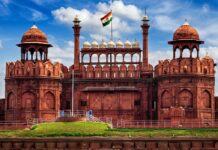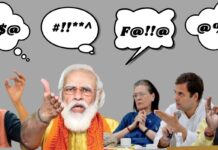[vc_row][vc_column][vc_column_text]
Delhi is no longer the same. With Parliament passing The National Capital Territory of Delhi (Amendment) Bill, 2021 the fulcrum of the Delhi government is shifted to the office of lieutenant governor (L-G), a Central government appointee. Now that the Amendment Bill has become an Act the Delhi government means L-G, not the elected government headed by Arvind Kejriwal.
After smooth sail in the Lok Sabha where the ruling BJP has a thumping majority, the Rajya Sabha cleared the aforementioned Bill with an 83-45 vote. The Bill gives sweeping powers to the L-G and the chosen assembly would have no option but to follow his diktats. The newly enacted law categorically lays down that the state government will now have to refer all the laws passed by it to the L-G for approval. The opinion of the L-G will be mandatory.
With this amendment, the Delhi Assembly has been literally stripped of its power to govern and take decisions for even the welfare of the Delhites. This curtails the powers and scope of governance of chief minister of Delhi and the Legislative Assembly that chooses him.
The BJP had tried to stall the Kejriwal led AAP government in tracks earlier too, by stalling the files through L-G. This had led the Delhi CM to stage a sit-in dharna at his office. The party also tried to disqualify the AAP MLAs. Both the moves were an attempt by the Central government to clip the wings of the Delhi government. However, the AAP was shrewd enough to defeat these moves dexterously through the legal intervention and mobilisation of public opinion. But this time around it is a different matter as a law has been passed by Parliament, the ultimate law-making forum in the country.
It is now left to the discretion of the L-G, appointed by the Central government, to seal the fate of any or every file moved by the state government. The only saving grace is that Arvind Kejriwal still would be the chief minister and the assembly would still function as Delhi assembly. But their role would be of a recommending body rather than a governing one. This time, it is the BJP that has the last laugh.
Outraged by the unwarranted move by the Centre, the AAP is already on the streets to protest this civil coup d’état. The passage of the Bill provided the Opposition ammunition against the government and an opportunity come together closing their ranks in a rare display of unity. There was pandemonium in the House throughout the legislative process.
Several political parties, including the Congress, vehemently opposed the legislation calling it unconstitutional and hence against the basic spirit of democracy and federalism. The Bill could be passed in the Rajya Sabha following angry protests and a walkout by several Opposition parties.
The Bill was cleared by the Upper House after several hours of heated exchange between the treasury and Opposition benches followed by a demand for a division of votes by the Opposition. The Biju Janata Dal (BJD), YSR Congress, and Samajwadi Party opposed the Bill, but chose to walk out in protest rather than voting against it. The Congress too walked out after the division of votes.
Reacting to the development, Chief Minister Arvind Kejriwal tweeted, “RS passes GNCTD amendment bill. Sad day for Indian democracy. We will continue our struggle to restore power to people…”.
The Opposition demanded the Bill to be referred to a select committee for scrutiny and incorporation of their concerns. Congress MP Abhishek Manu Singhvi said, it is the “most unconstitutional Bill” which the House has ever received. “Even the Delhi BJP should join us in opposing this”. “Make no mistake, friends, this is not about AAP, or Congress or BJP. It’s about the fundamentals of federalism…,” he warned.
One provision of the Bill reads: “…and any of the rules made in contravention of this provision before the commencement of the Government of National Capital Territory of Delhi (Amendment) Act, 2021, shall be void”. This would effectively kill the assembly committees.
Congress leader Mallikarjun Kharge asserted that the definition of the government can only be the elected government.
Delhi is a Union Territory with a legislature. It came into being in 1991 under Article 239AA of the Constitution (Sixty-ninth Amendment) Act, 1991. As per the existing Act, the Legislative Assembly of Delhi has the power to make laws in all matters except public order, police, and land.
Ostensibly the Act will “promote harmonious relations between the legislature and the executive, and define the responsibilities of the government. But on the ground, it would only increase friction between the elected government and the Centre. As the L-G’s opinion will have to be sought on every decision it will only result in delay in the implementation of projects.
Unfortunately, the two constitutional bodies empowered by the constitution are on collision course. The root cause for this is of course realpolitik. The BJP failed to dislodge the AAP from the Delhi Assembly in the last state elections though it swept the Lok Sabha polls in 2019. After losing the assembly polls, the party was convinced that it is well neigh impossible to defeat the AAP in a straight fight in the ensuing civic polls. So, it chose to curtail its powers AAP.
The Narendra Modi led BJP Government at the Centre and the Kejriwal led AAP government in Delhi have always been at loggerheads. After coming to power for the second term, Kejriwal, on his part, did try to mend fences with the BJP in the hope that he could be given a free hand to rule Delhi. In a bid to placate his bête noire, he supported some of its most controversial moves. He even applauded BJP’s decision to strip the state of Jammu & Kashmir of its special powers by abrogating Article 370 leading to an indefinite lockdown and chose to keep mum on the Delhi riots the onus of which rests on the Central government. But none of his efforts to woo the BJP worked. The saffron party won’t tolerate the AAP in Delhi, the state where it has high stakes, no matter how accommodating he might become.
Now that the BJP government dealt the final blow, Kejriwal seems to have got what people started calling as poetic justice.
Unfortunately, the tug of war between the BJP and the AAP would spell doom for Delhi. The AAP has done commendable work in health and education in contrast to the dismal performance of the MCD under the BJP. This led to the rout of the BJP in the recently held MCD by-polls.
In fact, the BJP enacted the law with an eye on the upcoming MCD elections. The party which has been trying get even with the AAP since 2015 has now taken this constitutional route to fix its rival.
A 2018 Supreme Court verdict holds that L-G’s concurrence is not required on issues other than police, public order, and land. The new amendment overturned the ruling which can be challenged in the apex court. But till then it is a BJP rule in Delhi even if by proxy. And Arvind Kejriwal has no option but to put up with the political skulduggery while licking his wounds.
[/vc_column_text][/vc_column][/vc_row]
Disclaimer: We do undertake rigorous checks on content provided by contributors before publishing the same. If you come across some factual errors, kindly bring this into our notice and we shall review your objection and claim as per our policy and display correction credits and corrections on the article itself.
The opinion expressed in the article is of the writer. Writer is a freelance journalist/journalist based in Delhi





























